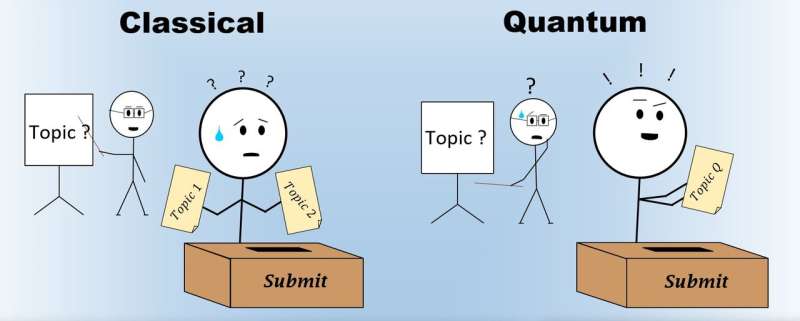Quantum physics provides a way to hide ignorance

Students can hide their ignorance and answer questions correctly in an exam without their lack of knowledge being detected by teachers鈥攂ut only in the quantum world.
University of Queensland researchers have successfully verified a counterintuitive idea from quantum theory鈥攖丑补迟 ignorance of the whole does not necessarily imply ignorance of the parts鈥攊n the lab.
UQ physicist Dr. Jacqui Romero from the ARC Centre of Excellence for Engineered Quantum Systems (EQUS) said the team's findings would be important when evaluating security in quantum encryption.
"What's also really nice is that we provide an accessible, real-world interpretation of a statement that comes from pure probability theory," Dr. Romero said.
According to classical intuition, ignorance can be traced to a source鈥攊f a student's knowledge of a book is incomplete, a teacher can design a test to probe which parts of the book are unknown to the student.
UQ Ph.D. candidate and EQUS experimental physicist Michael Kewming said that this wasn't always the case in the quantum world.
"Our results confirm that the student's source of ignorance can be concealed from the teacher using quantum systems," Mr Kewming said. "When we communicate, we use special symbols called letters that form an alphabet. In our study, we do the same thing but we use light to create a quantum alphabet."
According to Mr Kewming quantum alphabets have strange properties.
"Let's say the student is sitting an exam that covers two topics, and although they haven't studied they've been given a single hint by a knowledgeable friend," he said.
"In the classical situation, this hint can only be so helpful鈥攑roviding information about only one topic鈥攁nd the teacher can still uncover which topic the student is ignorant of. But a hint written using our quantum alphabet could simultaneously contain information about both topics, despite appearing to be about only one. As a result, the teacher cannot determine the source of the student's ignorance because the hint is always useful to the student."
The UQ research team was able to verify this in a physical experiment by writing information in the shape of single photons鈥攖he particles that make up light.
"Our result has implications for the security of quantum-based encryption because we have shown that what is true for classical hints is not true for quantum hints," Dr. Romero said.
Unfortunately for students preparing for exams, quantum hints won't be available outside the lab anytime soon.
The results are published in 糖心视频ical Review Letters.
More information: M. J. Kewming et al. Hiding Ignorance Using High Dimensions, 糖心视频ical Review Letters (2020).
Journal information: 糖心视频ical Review Letters
Provided by University of Queensland





















